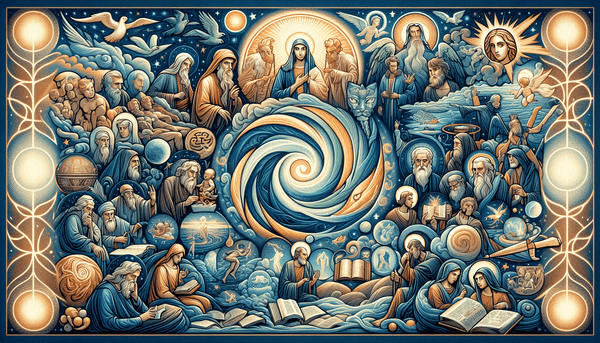Understanding the Differences Between Christians and Catholics
When we speak of 'Christians,' we refer to a broad category that encompasses all who believe in Jesus Christ as the Son of God and Savior, as noted in Acts 11:26, where the term was first applied to Jesus' followers. However, within this family of believers, there are many branches, and Catholicism stands as one of the most prominent. Catholicism, with its distinct beliefs in the authority of the Pope, the sacraments, and the Magisterium, represents a specific tradition that also values the veneration of saints and the Eucharist as central to its worship practices. These practices are grounded in the early Christian Church's teachings and traditions, distinguishing Catholics from other Christians who hold to diverse theological perspectives, as seen in 1 Corinthians 1:2 and Ephesians 4:4-6.
God's Commandments in Warfare
The Bible's stance on violence, particularly in the context of warfare, is a complex one. While the commandment 'You shall not murder' in Exodus 20:13 is a clear and universal ethical principle, the biblical narrative also records instances where God commands His people to engage in warfare, such as the battle of Jericho in Joshua 6:20-21. These acts are portrayed not as contradictions to the commandment, but as divine judgments or a means to establish justice. The Bible emphasizes the importance of understanding and acting within God's will, as illustrated in 2 Chronicles 20:15 and Judges 6:16, where the faithful are called to execute God's judgment in accordance with His divine plan.
The Problem of Evil
The existence of evil in a world created by a good and almighty God is a question that has long challenged believers and theologians alike. Scripture suggests that God's sovereignty and human free will coexist in a way that allows for the presence of evil, as seen in the narrative of the Fall in Genesis 3:1-7. Believers, however, can find solace in the deeper understanding of God's nature and divine wisdom, as further explored in a related blog post, which reassures us that God works in all things for the good of those who love Him (Romans 8:28). The Bible also points toward the ultimate triumph over evil, a promise encapsulated in the hope of a renewed creation where 'He will wipe every tear from their eyes. There will be no more death or mourning or crying or pain, for the old order of things has passed away' (Revelation 21:4).
Dietary Guidelines for Christians
While the Old Testament contains numerous dietary laws, such as those outlined in Leviticus 11:7-8, the New Testament presents a shift in perspective. Jesus declared all foods clean, as noted in Mark 7:18-19, freeing His followers from the constraints of the Mosaic Law regarding food. The apostle Paul also encouraged believers to eat with thanksgiving, recognizing that 'everything God created is good, and nothing is to be rejected if it is received with thanksgiving' (1 Timothy 4:4-5). Thus, Christians are encouraged to honor God with their bodies and to partake of food with gratitude, mindful of the broader spiritual and communal implications of their dietary choices.
Conclusion
Our journey through these theological landscapes offers only a glimpse into the vast expanse of Christian thought and practice. Whether it is understanding the rich traditions that distinguish Catholics from their Christian brethren, grappling with the moral complexities of warfare in the biblical context, or seeking solace in the face of evil, these topics challenge us to deepen our understanding of faith. As we reflect on the spiritual significance of fasting and the freedom found in the New Testament's approach to food, we are reminded of Christianity's ability to adapt and evolve while maintaining its core truths. May this exploration prompt further inquiry and a greater appreciation for the depth and breadth of the Christian tradition.
FAQ
Q: What does the term 'Christian' mean in the Bible?
A: In the Bible, the term 'Christian' is used to refer to followers of Jesus Christ. The word 'Christian' first appears in the New Testament in Acts 11:26, where it says, 'The disciples were called Christians first in Antioch.'
Q: What are some unique features of Catholicism?
A: Catholicism includes beliefs in the authority of the Pope, the importance of the sacraments, the veneration of saints, and the celebration of the Eucharist as central to worship.
Q: Why does the Bible portray God commanding warfare?
A: In the Bible, God's commands to engage in warfare are portrayed as forms of divine judgment or as means of carrying out His justice, distinct from murder, which is unjust killing.
Q: Why does God allow evil?
A: The Bible teaches that God allows evil as part of human free will and as a consequence of sin, but He ultimately works for good and promises to triumph over evil.






